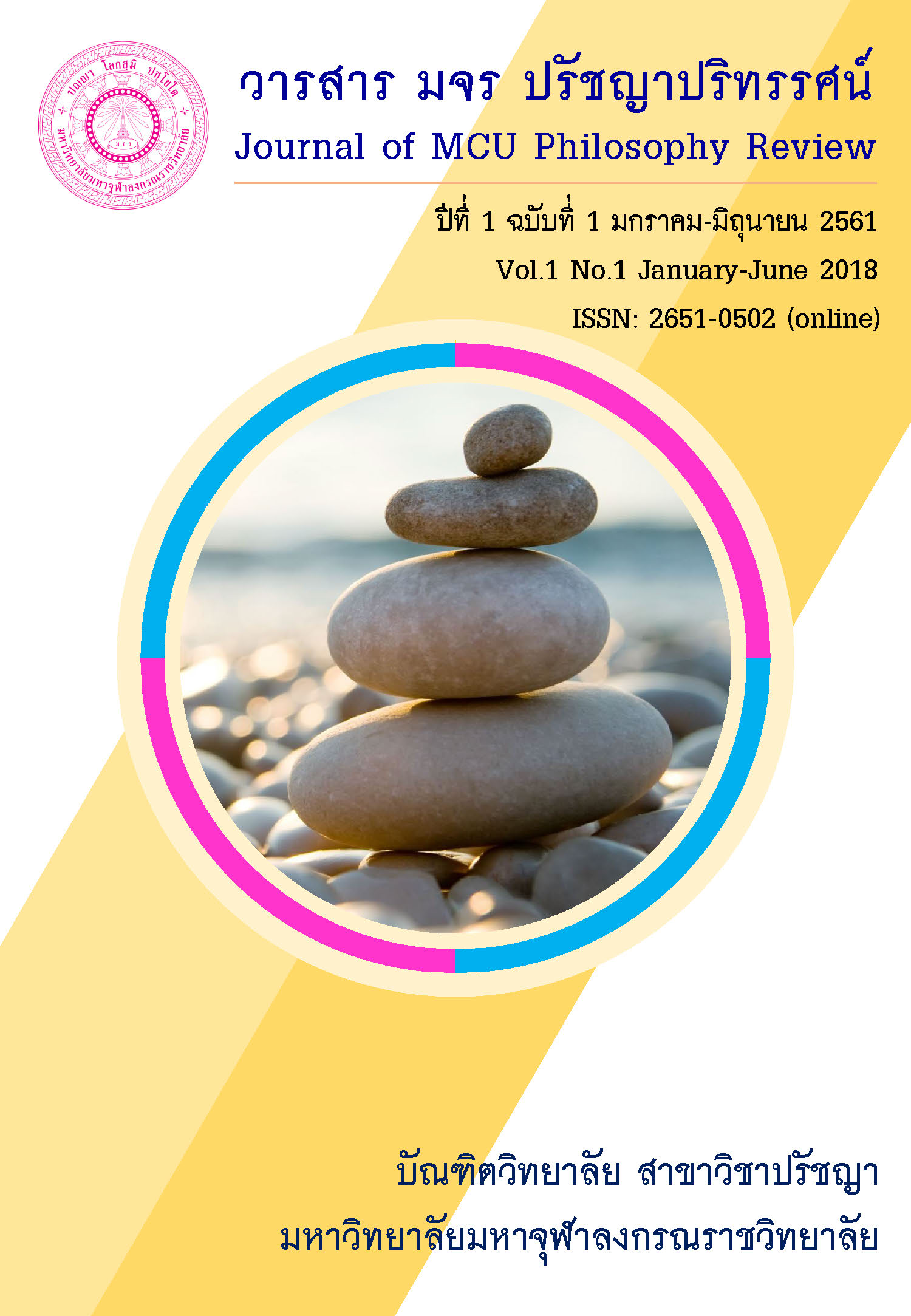An association with the wise people in Buddhism
Main Article Content
Abstract
This article attempts to reflect upon the value of association with the wise people in Buddhism. According to Buddhist view, the association with the wise people brings about wisdom because he possesses wisdom and intelligence in living life by virtue of such a quality. He is said to be a morally good person, benefiting himself and others. The characteristic of the wise is a person who thinks about good things, speaks of good things and does good actions. His goal of life is to gain the benefit of happiness in the present and future life. In Buddhism, there are four kinds of advantages in making friend with the wise: he can bring a blissful life, live happily with the wise, live without any harm. One can meet a prosperous life by the help of the wise, therefore, the association with the wise in daily life should be carefully considered. Then the way in making friend with people and its solution in society should be guided by Yonisomanasikãra, this means that one should think about it carefully as it really is. Suffice it to say that the most advantage in associating with the wise is to get oneself morally trained to be the wise because such a person always wishes to meet with the same kind of person, not with the fool. Therefore, the association with the wise can be called the most auspicious blessing in life, to wit, the second blessing just only refers to the association with the wise out of ๓๘ highest blessings.
Article Details
บทความที่ได้รับการตีพิมพ์เป็นลิขสิทธิ์ของวารสาร มจร ปรัชญาปริทรรศน์
ข้อความในบทความที่ได้รับการตีพิมพ์ในวารสาร ถือเป็นความรับผิดชอบของผู้เขียนบทความ และข้อคิดเห็นนั้นไม่ถือว่าเป็นทัศนะและความรับผิดชอบของกองบรรณาธิการวารสาร มจร ปรัชญาปริทรรศน์
References
ชวรงค์ ลิมป์ปัทมปาณี. (2556). “ข่าวลือ-ข่าวจริง? แยกแยะอย่างไรใน Social Media?”. ไทยรัฐ [ออนไลน์], แหล่งที่มา : http://www.thairath.co.th/content/. [10 ตุลาคม 2556].
พระธรรมปิฎก (ป.อ. ปยุตฺโต). (2546). พจนานุกรมพุทธศาสน์ ฉบับประมวลศัพท์. พิมพ์ครั้งที่ 10. กรุงเทพมหานคร : บริษัท เอส. อาร์. พริ้นติ้ง แมส โปรดักส์ จำกัด.
พระธรรมปิฎก (ป.อ. ปยุตฺโต). (2541). พุทธธรรม ฉบับปรับปรุงและขยายความ. พิมพ์ครั้งที่ 7. กรุงเทพมหานคร: โรงพิมพ์มหาจุฬาลงกรณราชวิทยาลัย.
พระพรหมคุณาภรณ์ (ป.อ.ปยุตฺโต). (2558). พจนานุกรมพุทธศาสตร์ ฉบับประมวลธรรม. พิมพ์ครั้งที่ 30. กรุงเทพมหานคร : สำนักพิมพ์ผลิธัมม์.
มหาจุฬาลงกรณราชวิทยาลัย. (2539). พระไตรปิฎกภาษาไทย ฉบับมหาจุฬาลงกรณราชวิทยาลัย. กรุงเทพ มหานคร : โรงพิมพ์มหาจุฬาลงกรณราชวิทยาลัย.
มหามกุฏราชวิทยาลัย. (2534). พระไตรปิฎกพร้อมอรรถกถา แปล. ชุด 91 เล่ม. กรุงเทพมหานคร : โรงพิมพ์มหามกุฏราชวิทยาลัย.
มหามกุฏราชวิทยาลัย. (2540). มังคลัตถทีปนี แปล เล่ม 1. พิมพ์ครั้งที่ 13. กรุงเทพมหานคร : โรงพิมพ์มหามกุฏราชวิทยาลัย.
ราชบัณฑิตยสถาน. (2546). พจนานุกรมไทย ฉบับราชบัณฑิตสถาน พ.ศ. 2542. กรุงเทพมหานคร : นามมีบุ๊คส์พับลิเคชั่นส์.
สมเด็จพระสังฆราช (จวน อุฏฺฐายี). (2534). มงคลในพระพุทธศาสนา. กรุงเทพมหานคร: ชวนพิมพ์.
สมเด็จมหาวีรวงศ์ (พิมพ์ ธมฺมธโร). (2539). มงคลยอดชีวิต ฉบับสมบูรณ์. กรุงเทพมหานคร: ธรรมสภา.


